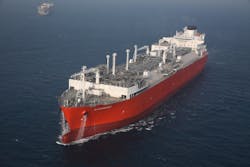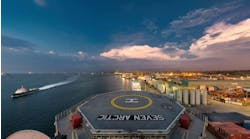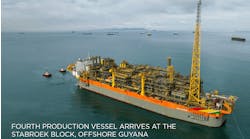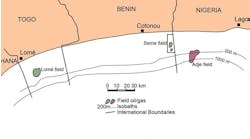Offshore staff
NEUILLY-SUR-SEINE, France -- Bureau Veritas (BV) has published a new Rule (NR645) for classification of floating storage and regasification units (FSRUs).
This sets out the requirements for addressing the technical and operational issues for units that may operate as a floating terminal for one or more decades to FSRUs operating for much shorter periods, and whose owners may want the option of trading as an LNG carrier.
The rules address all these needs, BV says, while applying a unified approach to safety and design challenges and providing clarity by offering two distinct class notations:
Liquefied Gas Carrier - FSRU notation
Based on rules for the classification of LNG carriers: this enables gas trading in addition to floating storage and regasification terminal operations. The notation also provides for possible exemptions from the traditional class survey regime, such as five year dry-docking surveys, when the vessel is in use as an FSRU.
FSRU notation
For units dedicated solely to gas storage and regasification terminal operations. This notation is said to provide a class survey regime as applicable to permanent units with continuous operation requirements.
No dry-docking would be necessary, and some exemptions are allowable from IGC Code requirements compared to typical LNG carriers. For example, there would be no bottom damage stability requirements, having addressed specific operational circumstances.
Jean-François Segretain, Marine Technical Director, Bureau Veritas, said: ”FSRUs are a special market with both ‘marine’ and ‘offshore’ approaches and requirements involved. So, FSRU projects raise a lot of questions from all stakeholders.
“These new rules take into account the specific technical, regulatory, operational and environmental requirements of FSRU stakeholders to provide a much higher level of confidence when making significant commercial decisions.”
10/10/2017



